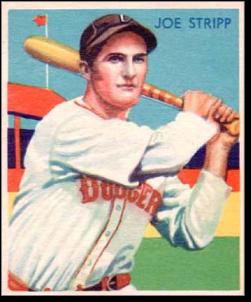
Sport: Baseball
Born: February 3, 1903
Died: June 10, 1989
Town: Harrison, New Jersey
Joseph Valentine Stripp was born February 3, 1903 in Harrison, NJ. Joe had a quick mind, a potent bat and was versatile enough with the glove to play either corner position or the outfield. After graduating from Harrison High School, Joe competed in semipro leagues before being signed by the Cincinnati Reds in 1924.
Joe was a consistent .300 hitter during his first four minor-league seasons. In his fifth, he was scorching the ball at a .419 clip when he was called up to the big leagues by the Reds in July of 1928. By 1930, he was the team’s regular third baseman, and soon carved out a reputation as a top defender and base runner, and a dependable .300 hitter. His .310 average in 1931 was 10th best in the National League.
In 1932, Joe was part of a big deal between the Reds and Dodgers that included future Hall of Fame catcher Ernie Lombardi and Babe Herman. Joe hit .300 for Brooklyn in four of the next five seasons.
In 1937, Joe was on the move again, one of four players sent to St. Louis for Cardinals shortstop Leo Durocher. After a brief stop with the Boston Bees, Joe ended up back in Brooklyn after the 1938 season. The Dodgers released him before Spring Training and he never played another major league game. His career average was .294, and he led the NL in fielding percentage several times.
Unlike most Depression-era players, Joe had a business to turn to after leaving the game. During the off-seasons, he operated a baseball school in Orlando, Florida, renting the spring training facilities of the Washington Senators.
Joe let his coaches coach and concentrated primarily on administrative functions. He had a good head for business. Earlier in his career, he had formed a team of All-Stars and arranged postseason barnstorming tours. His team sometimes faced Negro League squads.
Jersey Joe’s Baseball School was more of a finishing school than a camp, as it concentrated on tutoring boys who already had the talent to step into pro ball. He was able to turn a profit and keep a handful of teammates, coaches and friends employed as instructors—including Joe Tinker and Van Mungo. For his best students, Joe would pull strings to get them signed by minor league clubs. In 1940, the school was featured in a short film by Paramount entitled Tomorrow’s Stars.
Joe lived in Orlando until his death at age 86 in 1989.